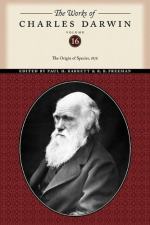As some degree of variation in instincts under a state of nature, and the inheritance of such variations, are indispensable for the action of natural selection, as many instances as possible ought to have been here given; but want of space prevents me. I can only assert, that instincts certainly do vary—for instance, the migratory instinct, both in extent and direction, and in its total loss. So it is with the nests of birds, which vary partly in dependence on the situations chosen, and on the nature and temperature of the country inhabited, but often from causes wholly unknown to us: Audubon has given several remarkable cases of differences in nests of the same species in the northern and southern United States. Fear of any particular enemy is certainly an instinctive quality, as may be seen in nestling birds, though it is strengthened by experience, and by the sight of fear of the same enemy in other animals. But fear of man is slowly acquired, as I have elsewhere shown, by various animals inhabiting desert islands; and we may see an instance of this, even in England, in the greater wildness of all our large birds than of our small birds; for the large birds have been most persecuted by man. We may safely attribute the greater wildness of our large birds to this cause; for in uninhabited islands large birds are not more fearful than small; and the magpie, so wary in England, is tame in Norway, as is the hooded crow in Egypt.
That the general disposition of individuals of the same species, born in a state of nature, is extremely diversified, can be shown by a multitude of facts. Several cases also, could be given, of occasional and strange habits in certain species, which might, if advantageous to the species, give rise, through natural selection, to quite new instincts. But I am well aware that these general statements, without facts given in detail, can produce but a feeble effect on the reader’s mind. I can only repeat my assurance, that I do not speak without good evidence.
The possibility, or even probability, of inherited variations of instinct in a state of nature will be strengthened by briefly considering a few cases under domestication. We shall thus also be enabled to see the respective parts which habit and the selection of so-called accidental variations have played in modifying the mental qualities of our domestic animals. A number of curious and authentic instances could be given of the inheritance of all shades of disposition and tastes, and likewise of the oddest tricks, associated with certain frames of mind or periods of time. But let us look to the familiar case of the several breeds of dogs: it cannot be doubted that young pointers (I have myself seen a striking instance) will sometimes point and even back other dogs the very first time that they are taken out; retrieving is certainly in some degree inherited by retrievers; and a tendency to run round, instead of at, a flock of sheep, by shepherd-dogs. I cannot see that




